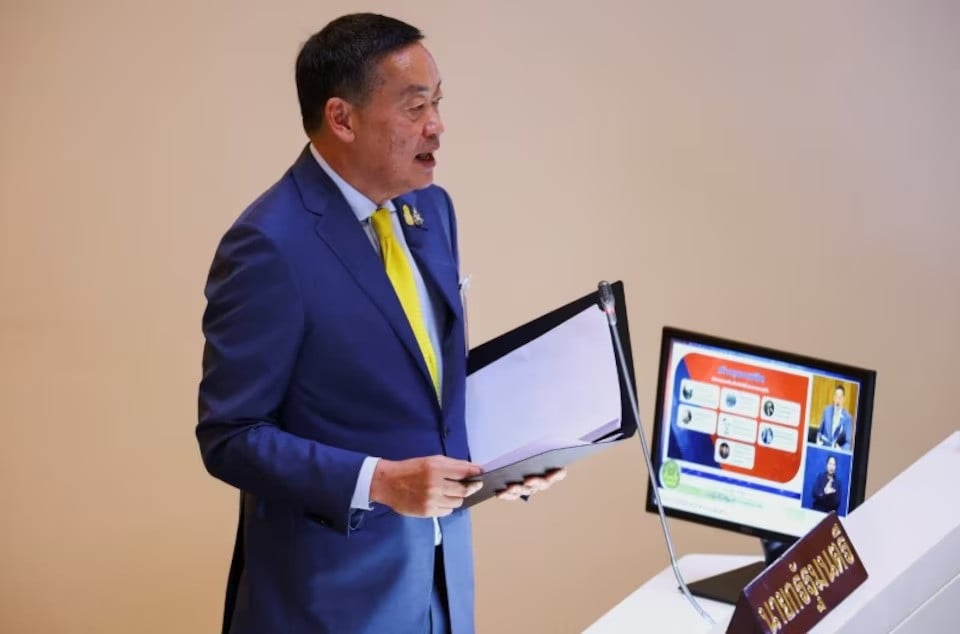BANGKOK, THAILAND:
Thailand’s Constitutional Court has dismissed Prime Minister Srettha Thavisin, citing a “gross violation” of ethics for appointing a minister with a past criminal record. This decision on Wednesday raises the likelihood of political instability and potential shifts within the governing coalition.
Srettha, a real estate tycoon, becomes the fourth Thai prime minister in 16 years to be removed by the same court, highlighting the judiciary’s significant role in the country’s prolonged political turmoil. His removal after less than a year in office necessitates the selection of a new prime minister, with parliament scheduled to convene on Friday to vote on a successor.
The Pheu Thai Party, the largest party in the ruling coalition, swiftly moved to stabilize the alliance, announcing plans to meet on Thursday to nominate a candidate for prime minister before the special parliamentary session.
Pheu Thai, and its predecessor parties, have faced repeated challenges in Thailand’s political landscape, with two previous governments ousted by military coups. The Shinawatra family, founders of the party, have been at the center of a long-standing conflict with the conservative establishment and the military.
The court’s decision to dismiss Srettha was made by a 5-4 vote, with the judges concluding that he failed to uphold integrity in his duties. “The accused is terminated as prime minister due to his lack of honesty,” the judges stated, emphasising that his actions “grossly breached ethical standards.”
This ruling follows another significant court decision just a week earlier, which led to the dissolution of the opposition Move Forward Party—the winner of the 2023 election—due to its campaign to amend a law against insulting the monarchy.
The court argued that this campaign threatened the constitutional monarchy. Despite this setback, Move Forward has rebranded itself as a new party, committed to advancing its anti-establishment agenda.
Srettha’s tenure as prime minister was marred by economic challenges, including weak exports, sluggish consumer spending, high household debt, and limited access to loans for over a million businesses. The court’s decision adds further uncertainty to an already fragile economy.
Trinity Securities analyst Nuttachart Mekmasin described the ruling as a “negative surprise” and a direct risk to the economy, warning that key policies, such as Srettha’s 500 billion baht ($14.3 billion) cash handout plan, could be stalled. He predicted a decline in consumer and business confidence, which would likely slow spending and investment until a new government is formed.
Thailand’s economy was already projected to grow by just 2.7% in 2024, lagging behind regional peers. The stock market, one of Asia’s poorest performers this year, fell by 1.29% following the ruling before closing down 0.4%.
In response to the court’s decision, Srettha expressed his disappointment, acknowledging that the next government could alter his policy agenda. “I am saddened to leave as a prime minister who was found to be unethical,” Srettha told reporters. “I performed my duties with integrity and honesty.”
Srettha’s downfall was linked to his appointment of Pichit Chuenban, Thaksin Shinawatra’s former lawyer, to the cabinet. Pichit had been briefly imprisoned for contempt of court in 2008 over an unproven allegation of attempting to bribe court staff.
The complaint against Srettha was filed by 40 former senators appointed by the military after the 2014 coup against Pheu Thai’s last government. Deputy Prime Minister Phumtham Wechayachai has stepped in as caretaker premier following Srettha’s dismissal.
Despite the upheaval, the United States reaffirmed its commitment to its alliance with Thailand, expressing hope for the swift selection of a new prime minister and a smooth transition of power.
Political analysts believe that Pheu Thai still has the influence to lead the next government, though it remains uncertain who will assume the role of prime minister.
Anutin Charnvirakul, leader of the Bhumjaithai Party, the second-largest partner in the coalition, stated that the alliance remains strong and that Pheu Thai should lead the formation of a new government. Anutin, a seasoned dealmaker who has navigated both sides of Thailand’s political divide, is one of several candidates eligible for the premiership, alongside Pheu Thai’s former Justice Minister Chaikasem Nitisiri, party leader Paetongtarn Shinawatra, and acting Energy Minister Pirapan Salirathavibhaga. Another potential candidate is Prawit Wongsuwan, a staunch royalist and former army chief with a history of involvement in two military coups.







